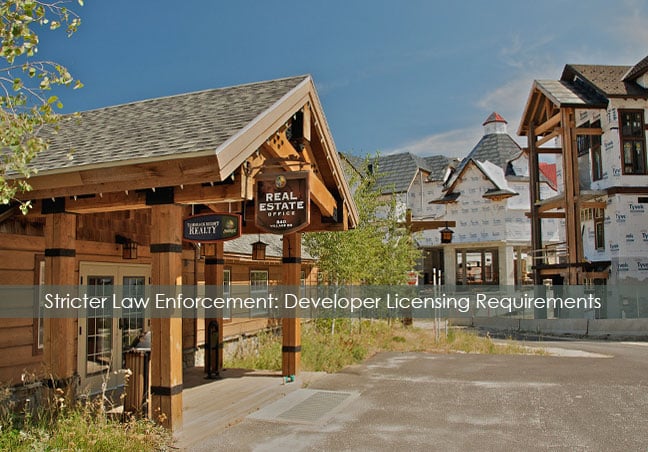![]()

Prakas No. 965 (MEF) on the Management of Residence Development Business was dated August 24, 2016 and aims to get developers to obtain a license from the Finance Ministry.
The Director of the Finance Ministry, Mr. Noung Piseth, said that only around 167 housing developments, 104 gated communities, and 63 condominiums that are currently underway are actually authorized by the Finance Ministry. He estimates that around 10 to 20 percent of current developments have no licenses. And this is causing concern from buyers who have already purchased units from these developers.
This prakas (law) affects real estate developments that either have more than 4 apartments, 3 villas, or 4 units. Developers who fit the criteria are considered to be a residence development business company and are now required to have a license through the Ministry of Economy and Finance, for several reasons.
Why should developers obtain a license?
Other than avoiding a fine for owners of unlicensed housing projects that can reach up to $25,000, getting a license actually has a well rounded advantage for everyone involved in a development. It benefits the customers, the developers, and the industry as a whole.
The Head of the Office of Business Management Housing Development at the Department of Industry and Finance, Ms. Chan Socheata, said that “generally, before the issuance of the license for any project development, the ministry evaluates through its checklist to find out whether the development has a clear and strong source of income, capital, collateral, land title, and other assets that support their project.”
She continues, “The ministry will check whether it’s a good business, and if it can be successful in the future or not. In some cases, there’s a need to research on the sales strategy of the project, because sometimes a project’s owner does not do an in-depth market analysis with the surrounding market. And another reason is to find whether this project causes a bubble market. So, if this case happens, the ministry can take measure immediately,”
And since a residence development business company is also required to deposit 2 percent of their capital, there is an assurance for both the ministry and the customer that there is enough resource for the project to successfully move forward and reach completion. Additionally, once a company is licensed, the ministry can serve as a mediator of sorts for any disputes that may arise between the developer and its customer.
What are the types of licenses?
Besides the 2 percent secured deposit, there is still a separate fee for each type of license that must paid by the company.
There are currently two types of licenses.
The first license is for companies which has either loaned from financial institutions or have their own capital that they can use for the development and sale of the property once construction is over.
The other license is for companies who have their own capital or loan from a number of financial institutions or capital that comes from installation payments by the buyer, where construction is still not over.
What are the Developer licensing requirements?
For the first type of license, the development company must already have finished construction with the cost already determined.
While the second type of license calls for the same requirement, it also calls for the development company to open a trust account where they will be placing payments from the customer.
Socheata also mentions that “project owners need to make a business plan to present to the ministry” before they are issued a license. There are also requirements that should be submitted after the project is finished. This is called a reporting requirement where the Ministry of Economy and Finance needs to be updated after a month of the project’s completion regarding financial soundness and the project ending.
With the release of this Prakas on developer licensing, we can expect to see positive changes in the aspects of construction and financing; and more transparency for end buyers - bringing much needed protections to the off-plan real estate market.
Learn more about Investing in Cambodia, with your real estate information leader: Realestate. com.kh!




Comments